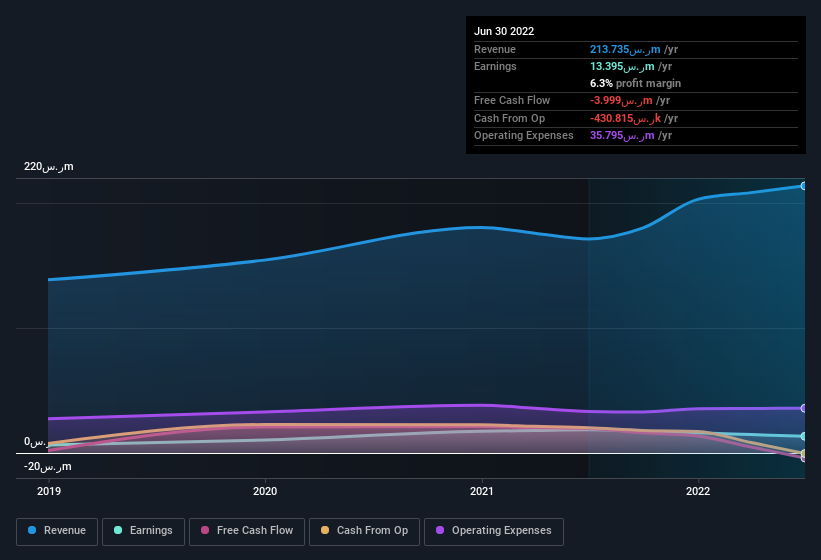- Saudi Arabia
- /
- Household Products
- /
- SASE:9517
National Fertilizer's (TADAWUL:9517) Sluggish Earnings Might Be Just The Beginning Of Its Problems

A lackluster earnings announcement from National Fertilizer Company Ltd (TADAWUL:9517) last week didn't sink the stock price. We think that investors are worried about some weaknesses underlying the earnings.
Check out our latest analysis for National Fertilizer

A Closer Look At National Fertilizer's Earnings
As finance nerds would already know, the accrual ratio from cashflow is a key measure for assessing how well a company's free cash flow (FCF) matches its profit. The accrual ratio subtracts the FCF from the profit for a given period, and divides the result by the average operating assets of the company over that time. This ratio tells us how much of a company's profit is not backed by free cashflow.
As a result, a negative accrual ratio is a positive for the company, and a positive accrual ratio is a negative. That is not intended to imply we should worry about a positive accrual ratio, but it's worth noting where the accrual ratio is rather high. Notably, there is some academic evidence that suggests that a high accrual ratio is a bad sign for near-term profits, generally speaking.
Over the twelve months to June 2022, National Fertilizer recorded an accrual ratio of 0.20. Unfortunately, that means its free cash flow fell significantly short of its reported profits. Over the last year it actually had negative free cash flow of ر.س4.0m, in contrast to the aforementioned profit of ر.س13.4m. We saw that FCF was ر.س20m a year ago though, so National Fertilizer has at least been able to generate positive FCF in the past. One positive for National Fertilizer shareholders is that it's accrual ratio was significantly better last year, providing reason to believe that it may return to stronger cash conversion in the future. Shareholders should look for improved cashflow relative to profit in the current year, if that is indeed the case.
Note: we always recommend investors check balance sheet strength. Click here to be taken to our balance sheet analysis of National Fertilizer.
Our Take On National Fertilizer's Profit Performance
National Fertilizer's accrual ratio for the last twelve months signifies cash conversion is less than ideal, which is a negative when it comes to our view of its earnings. Therefore, it seems possible to us that National Fertilizer's true underlying earnings power is actually less than its statutory profit. But at least holders can take some solace from the 60% per annum growth in EPS for the last three. Of course, we've only just scratched the surface when it comes to analysing its earnings; one could also consider margins, forecast growth, and return on investment, among other factors. Keep in mind, when it comes to analysing a stock it's worth noting the risks involved. For example, National Fertilizer has 5 warning signs (and 2 which are a bit concerning) we think you should know about.
Today we've zoomed in on a single data point to better understand the nature of National Fertilizer's profit. But there are plenty of other ways to inform your opinion of a company. For example, many people consider a high return on equity as an indication of favorable business economics, while others like to 'follow the money' and search out stocks that insiders are buying. While it might take a little research on your behalf, you may find this free collection of companies boasting high return on equity, or this list of stocks that insiders are buying to be useful.
If you're looking to trade MOBI Industry, open an account with the lowest-cost platform trusted by professionals, Interactive Brokers.
With clients in over 200 countries and territories, and access to 160 markets, IBKR lets you trade stocks, options, futures, forex, bonds and funds from a single integrated account.
Enjoy no hidden fees, no account minimums, and FX conversion rates as low as 0.03%, far better than what most brokers offer.
Sponsored ContentNew: Manage All Your Stock Portfolios in One Place
We've created the ultimate portfolio companion for stock investors, and it's free.
• Connect an unlimited number of Portfolios and see your total in one currency
• Be alerted to new Warning Signs or Risks via email or mobile
• Track the Fair Value of your stocks
Have feedback on this article? Concerned about the content? Get in touch with us directly. Alternatively, email editorial-team (at) simplywallst.com.
This article by Simply Wall St is general in nature. We provide commentary based on historical data and analyst forecasts only using an unbiased methodology and our articles are not intended to be financial advice. It does not constitute a recommendation to buy or sell any stock, and does not take account of your objectives, or your financial situation. We aim to bring you long-term focused analysis driven by fundamental data. Note that our analysis may not factor in the latest price-sensitive company announcements or qualitative material. Simply Wall St has no position in any stocks mentioned.
About SASE:9517
MOBI Industry
Manufactures and sells fertilizers and nitrogen compounds in the Kingdom of Saudi Arabia.
Flawless balance sheet with solid track record.
Market Insights
Community Narratives




